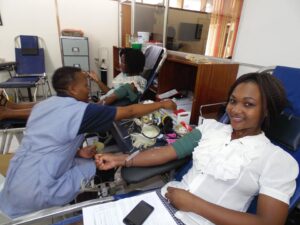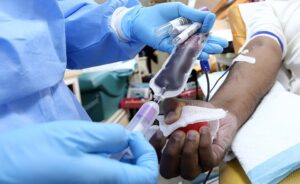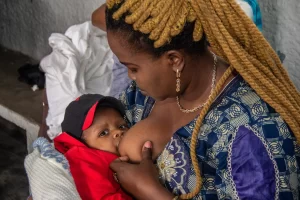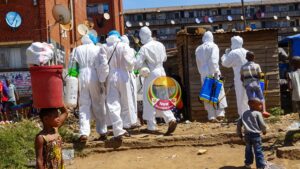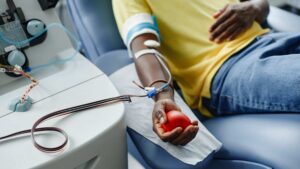CLAIM: The City of Bulawayo’s Health Services and Control department advises the public of a bedbug infestation in Nkulumane, specifically in areas including Sokusile, Emganwini and Nketa
SOURCE: Social media posts
VERDICT: False
In message that widely circulated on WhatsApp on 8 May 2025 and attributed to the Bulawayo City Council (BCC), the author claimed there was a bed bug infestation in Bulawayo.
‘The City of Bulawayo’s Health Services and Control department advises the public of a bedbug infestation in Nkulumane, specifically in areas including Sokusile, Emganwini and Nketa,’
The writer further claims that 300 houses in the country’s second largest city have been reported to have bugs. Loss of blood and body wounds are cited by the claimant as some of the symptoms of bedbug bites. Warning residents to avoid non-essential visits to affected areas, the author of the message further urges them to visit nearest Council offices if they experience any symptoms.
See the claim below:
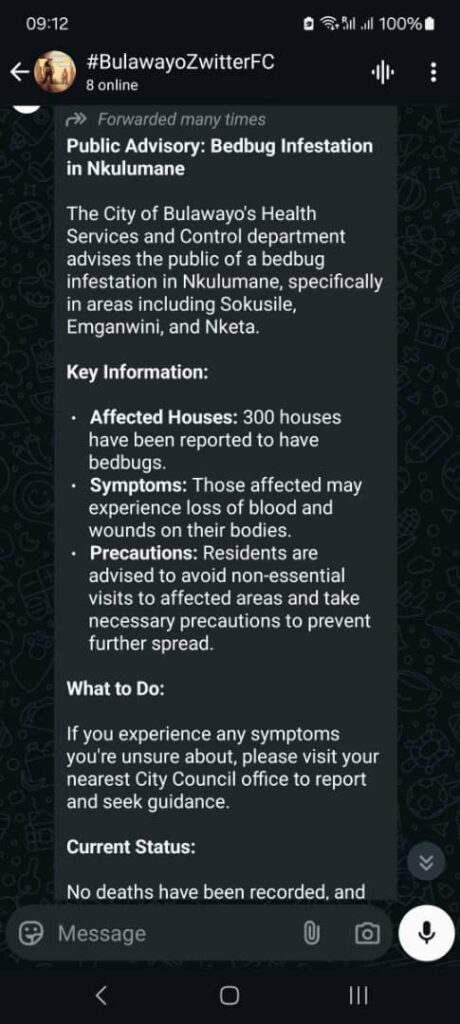
The claim had been picked by other social media accounts, here.
Context of the claim
The claim has been made at a time when the country is on high alert for bedbugs, following an infestation reported in Mbare, Harare, last month, thus making unsuspecting readers easily fall for it.
The bed bug outbreak in Mbare has reportedly spread to neighbouring suburbs including Chitungwiza, Mabvuku, Kuwadzana and Budiriro. Residents in the affected suburbs have lamented sleepless nights and relentless itching, as the tiny, bloodsucking insects have seemingly developed a resistance to the chemicals being deployed in the city’s fumigation programme. As of April 25, the City of Harare reported that 64 percent of the 5 450 targeted rooms had undergone fumigation in the first of three planned rounds.
Matter of fact
The BulawayoZwitterFC X account does not have the claim, which is purportedly extracted from it. On the other hand, the City of Bulawayo, has since dismissed the message as ‘false and malicious,’ adding the local authority has not received any reports of bedbugs.
‘The City of Bulawayo would like to advise members of the public that the message currently making rounds on social media claiming that there is a Bedbug infestation in the Nkulumane Suburb, specifically in areas including Sokusile, Emganwini, and Nketa, is false and malicious,’ said Bulawayo Town Clerk, Christopher Dube in a statement dated 8 May, 2025.
‘The City of Bulawayo has not received any reports of bedbugs. The City of Bulawayo remains on high alert for bedbug infestation following reports in other parts of the country. To avoid unnecessary confusion and panic, residents are further advised to in future ignore any circulation on the City that does not bear and carry the City of Bulawayo logo and insignia as per the city’s usual practice of keeping the residents informed. For official information on the City of Bulawayo kindly visit our website and Social media platforms.’
Tell-tale signs that the message is a scam/fake:
- The post is a screenshot with no link to the original official statement.
- The department responsible for health within the City of Bulawayo is called the Health Services Department and not the ‘Health Services and Control department,’ as claimed in the statement.
- No media house has published the story on the claim.
The city of Bulawayo in its statement, went on further to give the following information about bedbugs:
What Causes Bedbugs and How to Get Rid of Them
- Bedbugs infest their surroundings when someone unknowingly brings them.
- They feed on the blood of mammals, usually humans.
- They can find their way to your bed as they look for places to hide where
people spend a lot of time. - They can hide almost in any space where people gather, including homes, hotels, schools, office buildings, stores, and public transportation.
How do bed bugs spread?
- Bedbugs crawl rather than fly or jump, and they crawl rapidly.
- Their small size and hiding ability allows them to spread to new locations.
- The can be found in single-family homes, apartments and condominiums, short-stay rentals like hotels and motels, nursing homes, schools and day-care centres, office buildings, college dorms and hospitals
How to Tell If You Have Bedbugs
∙ Itchy red or discoloured bite marks on the skin that may form a cluster or line (referred to as
“breakfast, lunch, and dinner”) could be bedbug bites. They may appear on parts of the body that are uncovered while you sleep.
∙ Live insects are reddish-brown, with six legs, and about 1/4 inch in size.
∙ Bedbug eggs are white oval-shaped objects about the size of a pinhead or a grain of rice and
are usually found in clusters.
∙ Bedbug shells, which they shed as they grow, are translucent or light brown ovals.
∙ Bedbug excrement appears as black spots on bedding or furniture.
∙ Spots of blood on bedding or soft furniture can be left from bedbugs as they feed.
∙ You may detect a sweet, musty smell in the room as a result of the release of pheromones
(chemicals that attract others of the same species) by the bedbugs.
Some Tips for preventing bedbug infestations
∙ When you arrive at a hotel or other short-term lodging, check the mattress, bed frame, and
headboard before unpacking your suitcase.
∙ Before bringing used furniture, clothing, and other items home, check them closely for signs of insects.
∙ Clean your properties often, especially after trips or if people have been coming and going into your home.
∙ Use a light-colour mattress cover to make bugs or their detritus easier to spot. Also, consider using protective mattress covers and pillow covers.
∙ Reduce clutter so there are fewer hiding spaces for bed bugs.
∙ If you have travelled or been in a place with many people, put your clothes in a dryer and run them on high heat for at least 20 minutes.
Conclusion
The claim: ‘The City of Bulawayo’s Health Services and Control department advises the public of a bedbug infestation in Nkulumane, specifically in areas including Sokusile, Emganwini and Nketa,’ has been rated as false in that its author sought to take advantage of the Harare outbreak to hoodwink readers into believing that it has since spread to Bulawayo, which is not true. The City of Bulawayo has since distanced itself from the message dismissing it as ‘false and malicious.’
